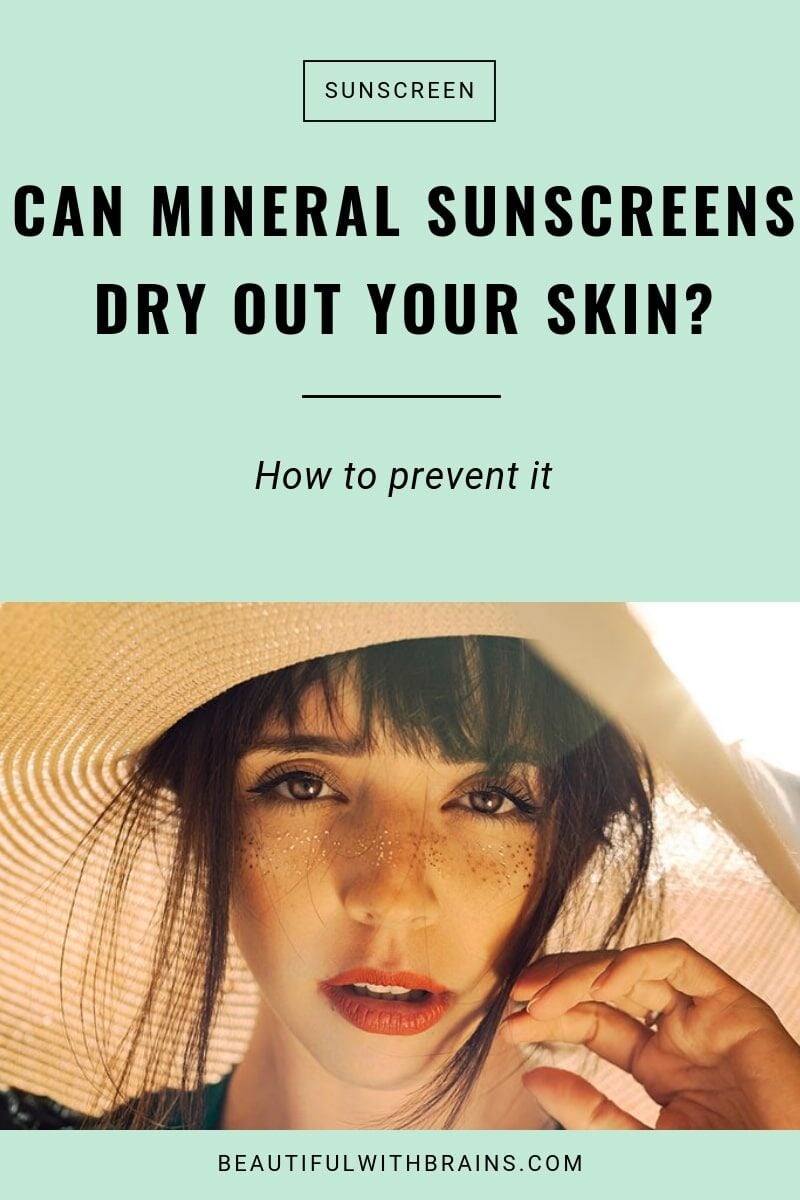
Is your mineral sunscreen drying out your skin?
If you’ve just switched to a mineral sunscreen and your skin’s now drier than the Sahara, fret not. You’re not going crazy. Mineral sunscreens can dry out skin.
Here’s why it happens (and how to prevent it):
What Are Mineral Sunscreens?
First things first: what are mineral sunscreens?
Mineral sunscreens take their name from the UV filters they use. Zinc oxide and titanium dioxide are two white minerals that protect skin from both UVA and UVB rays.
Rumour has it, they do so by creating a shield on the skin that scatters UV rays away from it. That’s only partly true. These filters do scatter some UV rays away.
But they deal with the vast majority of ultraviolet radiation that hits your skin the same way chemical filters (like Avobenzone) do: by absorbing it and transforming it into a less damaging form of energy (heat).
Even though they work pretty much the same way, mineral filters are way gentler and rarely cause irritations. Heck, even babies can use them!
Related: 5 Myths About Mineral Sunscreens You Need To Stop Believing Right Now
How effective is your sunscreen? Sign up to the newsletter below to receive the “Sunscreen Audit” Worksheet and find out if your sunscreen is really up to the job:
Can Mineral Sunscreens Dry Skin?
Yes, mineral sunscreens can dry out your skin. Blame it on zinc oxide.
This white mineral is the best UV filter around (in my humble opinion). It protects, on its own, from the entire UV range – without giving you a rash.
But zinc oxide is also a mild astringent. An astringent is an ingredient that constricts bodily tissues or makes skin less oily.
In other words, astringents help remove excess oil from the skin. That’s cool, if you have oily skin that could do with less oil.
Dry skin? Your sebaceous glands produce very little sebum already. The last thing you want is for zinc oxide to soak it all away.
Related: The Best Skincare Routine For Dry Skin
How Can You Tell If Your Mineral Sunscreen Is Drying Out Your Skin?
FYI, just because you’re using a sunscreen with zinc oxide, it doesn’t mean it will dry out your skin. It depends on several factors:
- Skin type: If your skin is pumping out way more oil than it needs, you likely have nothing to worry about. Zinc oxide is more drying for dry than oily skin.
- Concentration: The higher the amount of zinc oxide in the sunscreen, the higher the chance it’ll dry out your skin. Luckily, higher concentrations DON’T equal higher protection (the size of zinc oxide particles and how they’re formulated do – but you can’t tell that stuff from a label).
- Moisturising ingredients: The more moisturising ingredients in the formula, the lower the chance of dryness.
Related: How To Figure Out Your Skin Type (Plus, Free Test)
How Do You Prevent Sunscreen From Drying Out Your Skin?
You have two options here:
- Layer mineral sunscreen over moisturiser: I’m the first to say that, if your sunscreen is moisturizing enough, you don’t need a separate moisturizer (especially if you have oily skin). But if you have dry skin, always apply your fave facial moisturiser underneath sunscreen to keep your skin soft and supple all day. You can find my fave moisturizers for dry skin here.
- Switch to a chemical sunscreen: Contrary to popular opinion, chemical sunscreens aren’t the devil. It’s true chemical filters are more likely to irritate sensitive skin. But if they don’t irritate YOUR skin, there’s no reason why you shouldn’t use them. If they could save your dry skin from getting more parched than the Sahara, make the switch.
Related: What’s The Difference Between Mineral And Chemical Sunscreens?
The Bottom Line
It’s not just in your head. Mineral sunscreens can dry out your skin, especially if it’s already dry. If this is happening to you, make sure you always use moisturizer with your sunscreen. Or just opt for a chemical sunscreen instead.
Has a mineral sunscreen ever dried out your skin? Share your experience in the comments below.


Yes I dins they dry my skin out. I will try a moisturizer first. I reallydont want chemical sunscreens. Im so sensittive. Hopefully this will help, but how long should you wait between both so that the sunscreen does stick to the face?
I have light sensitive skin with rosacea and was told by my dermatologist to use a physical sunscreen daily. I haven’t been able to find one that isn’t drying (not helped by my current in-progress search for a non-irritating moisturizer too). So far I’ve tried ColorScience Sunforgettable (decent but too tinted to want to use daily) and Replenix (very sheer and feels awesome to apply, BUT it dries me out within a few hours and makes my skin flaky, even if I put CeraVe under it before applying). Recommendations for sensitive skin welcome!
I’m in my 40s, and even though I try to have a “natural” skin regimen, I often fall back on chemical sunscreen just for my face because I cannot find a mineral block that does not dry out my skin. I’ve tried several high quality brands with no luck, and I always used moisturizer before applying. I just try to tell myself that the very small amount of chemical sunscreen on my face is okay. Thanks for the post because it seems like every other website only says how wonderful zinc oxide is, but I wonder if they are really asking women over 40 to be honest about what it does to their skin?